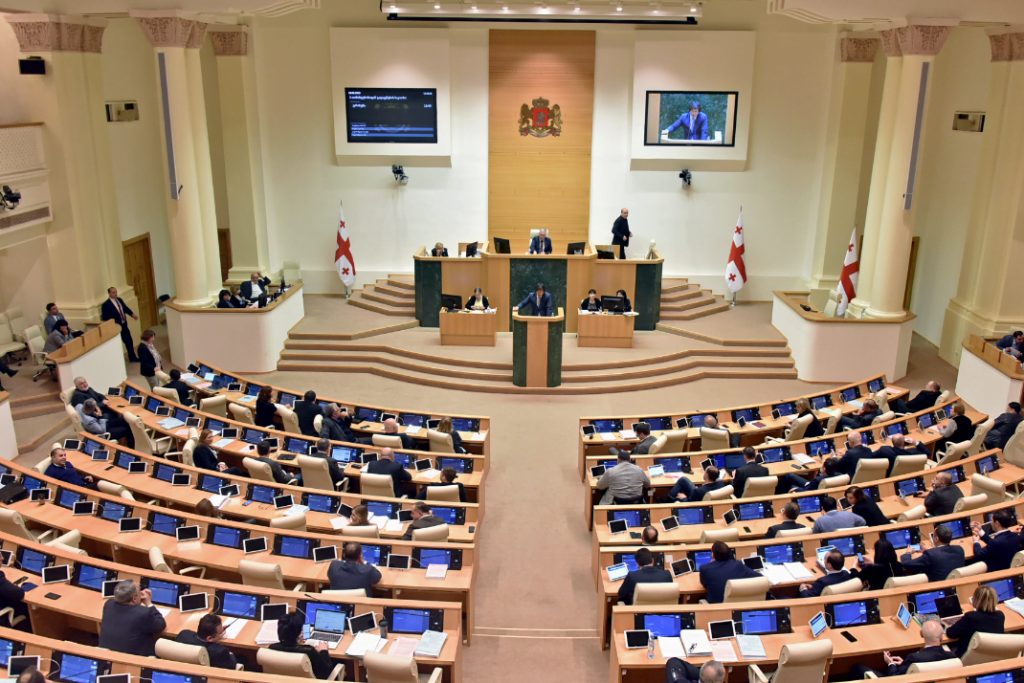With 89 votes cast for and 31 against, the Georgian Parliament endorsed on March 20 the controversial amendments to the Law of Georgia on Common Courts, backed by the ruling Georgian Dream.
The bill drew strong criticism from opposition and civil society groups, who say its provision help retrench a network of politically connected judges (“the clan”).
The parliamentary opposition did not support the bill, saying that it was tailored to the interests of the so called “clan” in the High Council of Justice. A competing bill, developed by the opposition European Georgia was voted down, as only 24 MPs voted in favor and 42 against.
A number of civic activists working on judicial reform attended the parliamentary committee hearings wearing T-shirts that read “the clan should go away.”
Political debates
MP Otar Kakhidze of European Georgia noted that the ruling party proposal would help “the clan” monopolize nomination of the judges.
MP Roman Gotsiridze of the United National Movement (UNM) said that “the judiciary has collapsed in Georgia” and that the country is ruled by one person (Bidzina Ivanishvili, GD founder and leader) through the “judicial clan”. “The judiciary is one of the most important levers in the hands of this person for pursuing the country’s policy, including repressive policy,” MP Gotsiridze said.
Parliament Chairman Irakli Kobakhidze (GD), who is one of the co-sponsors of the bill, noted that the legislative proposal foresees transparent procedures for selection of judges that will enable the public to track the process of nominations and approval carefully.
He also noted that the draft has been submitted for the Council of Europe’s Venice Commission for assessment, and in case the Commission does not provide its conclusion in coming two weeks, the GD-led majority is ready to postpone further deliberations on the Parliament floor.
Closer look: What does the endorsed draft say?
-
Who can be nominated to the Supreme Court?
Georgian citizen who is older than 30, with higher-level judicial degree education and the relevant work experience, is eligible to be nominated to the Supreme Court. The “relevant experience” is interpreted to include: incumbent and former judges more than five years of tenure; those former judges who have stopped practicing less then ten years ago; experts of law with five years of work experience, who have passed the qualification exams to become judges.
-
How are the Supreme Court judges appointed?
The High Council of Justice (HCoJ) announces a competition to select the candidates. After receiving the applications, it posts the list of eligible applicants and their biographies on HCoJ official website.
To arrive at the long-list of candidates, HCoJ takes the first secret ballot. Those selected then pass public interviews with HCoJ. Another secret vote takes place to further reduce the number of candidates.
The list of the finalist candidates is then made public. The HCoJ then votes to submit the candidates to the Parliament, for final approval. A candidate must get at least two thirds of the HCoJ members vote, to be submitted to the Palirment.
If the bill is passed, the candidates who have already been nominated to the court, but not yet approved by the Parliament will be recalled. The new procedure of selecting the candidates will be launched in a month after the adopted law enters into force, the latest.
Closer look: What was the opposition proposing?
-
Proposal by European Georgia
The competing bill on amendments to the Law of Georgia on Common Courts was developed by the opposition European Georgia.
It stipulated, that any member of the High Council of Justice has the right to nominate a candidate of the Supreme Court. The HCoJ submits all those candidates nominated by its members, who meet the requirements set out by article 34 of the law to the Parliament.
According to the same amendments, based on a justified motion of an HCoJ member, the Council may vote down the nominee, if all of its members vote to do so, except the one who nominated the candidate.
This proposal was voted down.
-
Proposal of “the thirteen”
MP Eka Beselia, erstwhile chair of the legal committee, who quit the ruling party over the Supreme Court nominations issue, and her 12 supporters initiated a package of competing proposals for amending the Law on Common Courts.
According to their proposal, the HCoJ was to announce an open competition to select Supreme Court judicial candidates. A Georgian citizen of over 30 years of age, with higher level legal education and at least 10 years of the relevant work experience, is eligible to participate. Importantly, according to this proposal, an incumbent member of the HCoJ can not be nominated to the Supreme Court. The former HCoJ members can be nominated if at least one year has passed since their termination from office.
According to the same package, candidates nominated by the HCoJ shall be vetted by a special working group created by the Parliament’s legal issues committee.
Background
Dispute over the Supreme Court nominations in the ruling Georgian Dream – Democratic Georgia started in late December, when the HCoJ submitted a ten-member list of nominees to the Parliament, triggering the resignation of Eka Beselia, chairwoman of the Committee on Judiciary.
MP Eka Beselia claimed the party’s parliamentary leadership, including Speaker Irakli Kobakhidze, was lobbying the controversial nominees, which she argued included some who “served Mikheil Saakashvili’s oppressive regime.”
This post is also available in: ქართული (Georgian) Русский (Russian)

